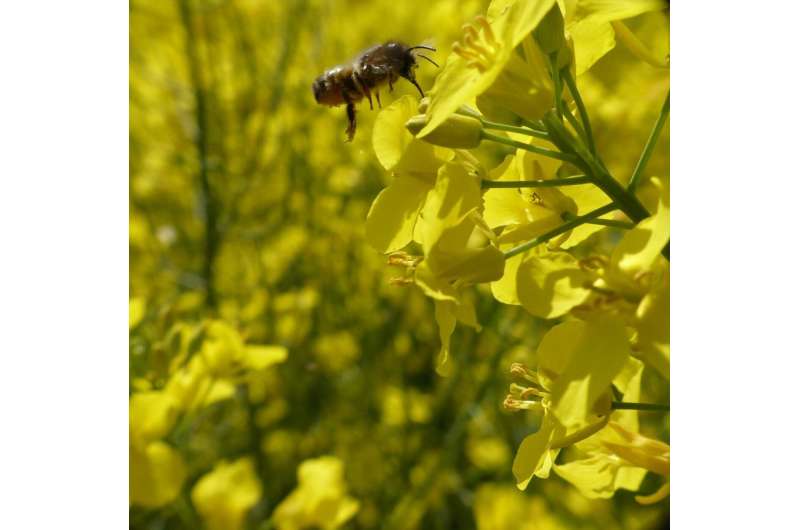#Wild bees need diverse agricultural landscapes

“#Wild bees need diverse agricultural landscapes”

Mass-flowering crops such as oilseed rape or faba bean (also known as broad bean) provide valuable sources of food for bees, which, in turn, contribute to the pollination of both the crops and nearby wild plants when they visit. But not every arable crop that produces flowers is visited by the same bees. A team from the University of Göttingen and the Julius Kühn Institute (JKI) in Braunschweig has investigated how the habitat diversity of the agricultural landscape and the cultivation of different mass-flowering crops affect wild bees. The research shows that diverse agricultural landscapes increase the species richness of wild bees. Flowering arable crops with different flower shapes support different wild bee species. The results of the study have been published in Landscape Ecology.
The research team recorded wild bees in flower-rich, semi-natural habitats such as hedgerows and flower strips in a total of 30 different agricultural landscapes, each covering one square kilometer, near Göttingen, Itzehoe and Leipzig. Researchers counted the number of bees along standardized sections and used a hand net to catch them and identify the species. The landscapes used in the study differed in their diversity and in the proportion of land covered by rapeseed and faba beans.
“The shape of the flower is an important criterion for determining which wild bee species will collect nectar from its flowers,” says Ph.D. student Felix Kirsch from the University of Göttingen, who conducted the study as part of his Master’s thesis. “For example, the shape of the flower must fit the bee’s body size and the length of its tongue. Nectar is easily accessible from rapeseed flowers, while the nectar of faba bean is hidden deep inside the flowers.”
“Our study shows that faba beans promote social wild bees, especially long-tongued bumblebees,” explains Dr. Doreen Gabriel from the JKI in Braunschweig. A different picture emerged in landscapes with large amounts of oilseed rape: here, the study found that the proportion of solitary wild bees, which often have a smaller body size, was higher. “The cultivation of a certain mass-flowering crop is not sufficient to maintain diverse bee communities, which in turn ensure the pollination success of many flowering arable crops and wild plants,” says first author Nicole Beyer, a postdoctoral researcher in the Functional Agrobiodiversity Department at Göttingen University. The head of the department, Professor Catrin Westphal, concludes that their “results show convincingly that diverse, flowering arable crops and especially diverse semi-natural habitats in the agricultural landscape are necessary to support a broad range of wild bee species.”
Bumblebees benefit from fava bean cultivation
Nicole Beyer et al, Identity of mass-flowering crops moderates functional trait composition of pollinator communities, Landscape Ecology (2021). DOI: 10.1007/s10980-021-01261-3
Citation:
Wild bees need diverse agricultural landscapes (2021, July 1)
retrieved 1 July 2021
from https://phys.org/news/2021-07-wild-bees-diverse-agricultural-landscapes.html
This document is subject to copyright. Apart from any fair dealing for the purpose of private study or research, no
part may be reproduced without the written permission. The content is provided for information purposes only.
If you liked the article, do not forget to share it with your friends. Follow us on Google News too, click on the star and choose us from your favorites.
For forums sites go to Forum.BuradaBiliyorum.Com
If you want to read more Like this articles, you can visit our Science category.




